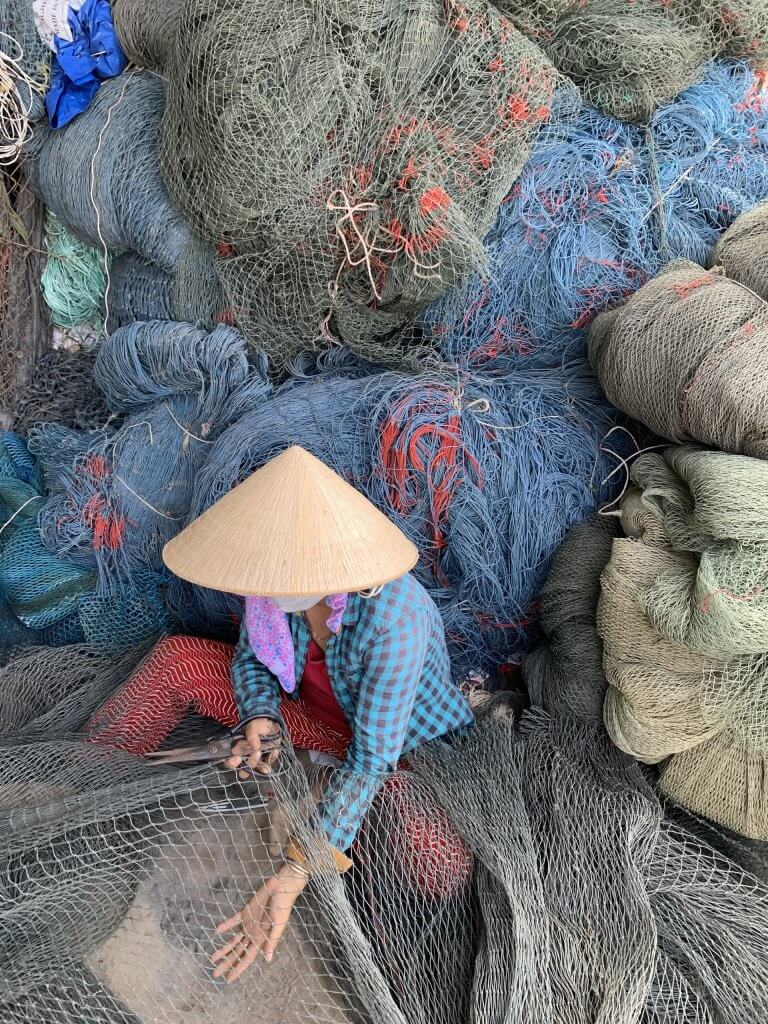Blog by Dr Duc Nguyen

In Viet Nam, the terms Ve chai or Đồng nát refer to informal waste workers who collect, trade, and recycle plastics and other scraps. This informal waste sector consists of many levels, keeping the so-called “waste” in the circular economy of the country and therefore reducing the amount of plastic waste leakage to the environment.
Level 1: Waste pickers pick up bottles, cans, and other tradable waste materials scattered on the roadsides, beaches, and dumpsites. Typically they would be the elderly with little or no stable income. They are the most vulnerable in the recyclable plastic value chain.
Level 2: Waste collectors buy recyclables from level 1 workers and directly from households and small businesses. They usually use bicycles, motorbikes, or boats to access the waste sources and transport the plastics to their shops.
Level 3: Waste wholesalers/consolidators purchase recyclable materials from level 2 workers and sources with a large volume of recyclables, such as big fishing boats or big businesses. They would sell different materials to various recyclers depending on the types.
Level 4: Recyclers are the final destination of recyclable waste materials, where plastic waste is converted into recycled plastic pellets. These recyclers are often located in big cities or craft villages (that specialise in producing specific craft products or plastic recycling).
In our field study in the coastal provinces of Hai Phong, Nam Dinh, Ba Ria-Vung Tau, and Ben Tre, almost everyone we interviewed knew about the informal waste workers in their area. Knowing that their used fish feed bags, styrofoam boxes, plastic bottles, and cans can be sold, even for a small amount, motivated local people, farmers, and fishers to collect and keep these items separate from other waste. They would not have to wait long for the informal waste collector to pass by. The existence of a convenient and effective informal waste collection system in Viet Nam enables people to adopt the practice of separating and recycling plastic. Yet, their reasoning seems to be mainly profit-driven rather than environmentally-driven action.
In concentrated areas with various aquaculture farms or large fishing ports, the informal waste sector is a thriving business. Instead of recycling everything, they usually gain a higher profit from reusing and repurposing plastic items. For example:
-Fish feed bags from aquaculture fish farmers will be sold to clam harvesters to store the products.
-Styrofoam boxes for transporting baby shrimp will be sold in the market to transport seafood.
-Old fishing nets will be fixed and old ropes will be repurposed into yarns for tying oysters or for other home uses.

Talking about what type of plastic waste is the most prominent in the community, a local elder said:
“… plastic bottles from the inland that were wasted do not exist anymore. Our people already picked them up from the river banks and main roads, and sold them for profit. Therefore, the only things left in the…canal are plastic bags and bottle caps… accumulated over time and eventually flow to the sea.”
Therefore, plastic waste of higher value and quantity will be likely collected, kept within the circular economy loop, and not be seen as “waste”. In Binh Dai port of Ben Tre province, even dirty plastic bags used to store fish and squid were collected and sold to the recyclers.
We invite everyone to recognise the informal waste sector of Viet Nam as Plastic Heroes. Thanks to them plastic waste is not wasted anymore. Even though recycling is not the sole solution to the global plastic pollution crisis, we must acknowledge the huge impact that the Ve chai and Đồng nát heroes have in keeping our oceans cleaner and reminding everyone about the value of plastics.

